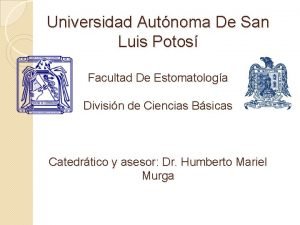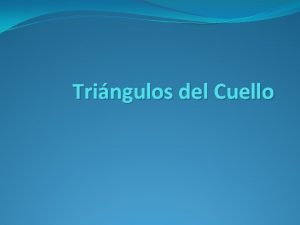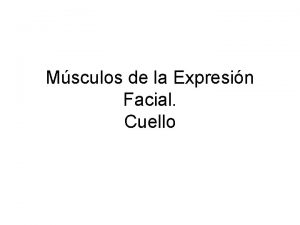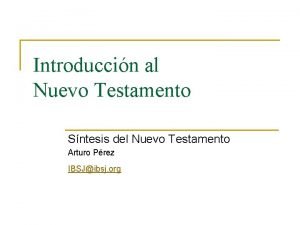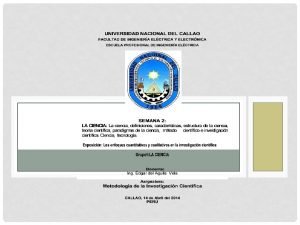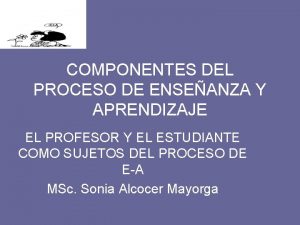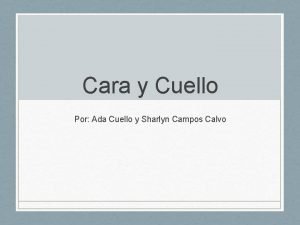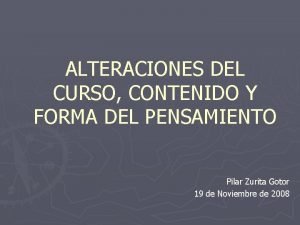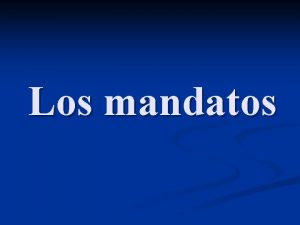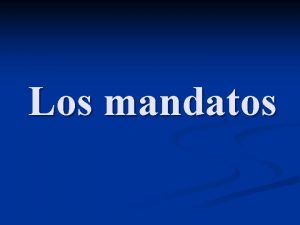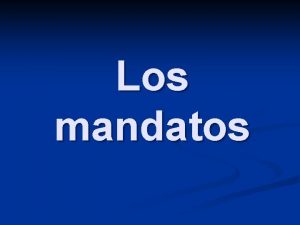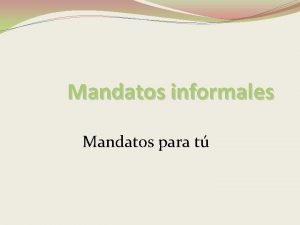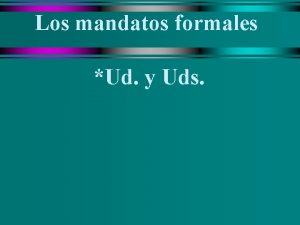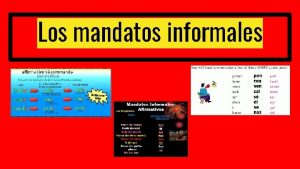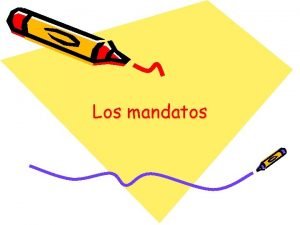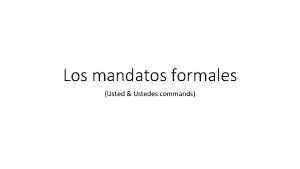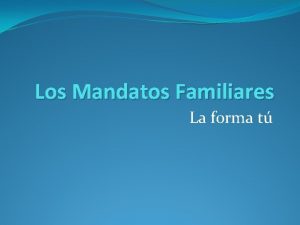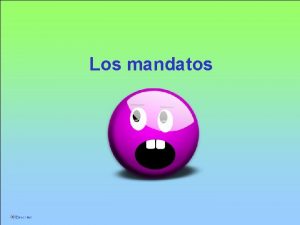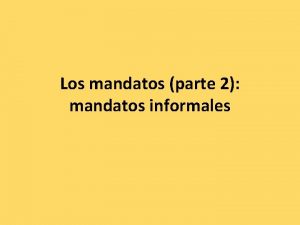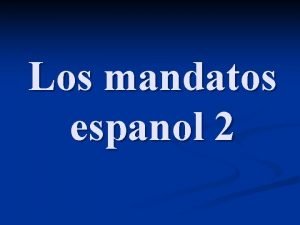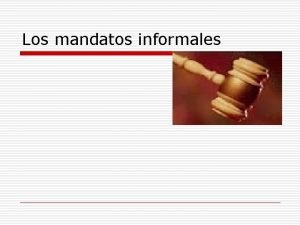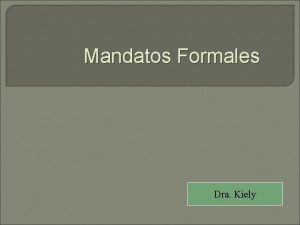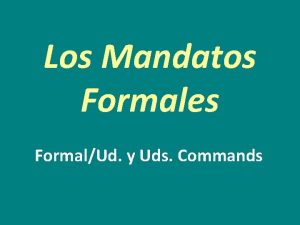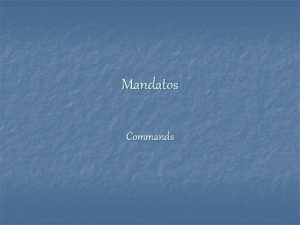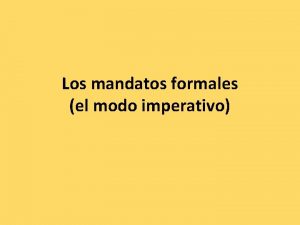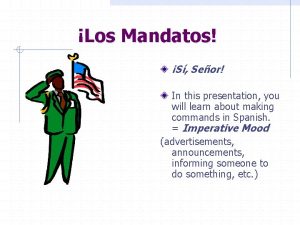Los Mandatos S Seor Contenido contents de esta





![Informal (tú) commands [mandatos afirmativos informales] First let’s concentrate on the tú (informal) commands Informal (tú) commands [mandatos afirmativos informales] First let’s concentrate on the tú (informal) commands](https://slidetodoc.com/presentation_image/025b4ba7f943ce888ad07d64d13f76ba/image-6.jpg)
![INformal (tú) commands [mandatos afirmativos informales] (regular verbs) OJO (look): abrir > ¡abre! comprar INformal (tú) commands [mandatos afirmativos informales] (regular verbs) OJO (look): abrir > ¡abre! comprar](https://slidetodoc.com/presentation_image/025b4ba7f943ce888ad07d64d13f76ba/image-7.jpg)
![INformal (tú) commands [mandatos afirmativos informales] (stem-change/boot verbs) The tú (you) is understood / INformal (tú) commands [mandatos afirmativos informales] (stem-change/boot verbs) The tú (you) is understood /](https://slidetodoc.com/presentation_image/025b4ba7f943ce888ad07d64d13f76ba/image-8.jpg)
![Informal (tú) commands [mandatos afirmativos informales] …and the (lovely) irregulars! : decir > di Informal (tú) commands [mandatos afirmativos informales] …and the (lovely) irregulars! : decir > di](https://slidetodoc.com/presentation_image/025b4ba7f943ce888ad07d64d13f76ba/image-9.jpg)
![Formal (usted/ustedes) commands [mandatos formales] --¡Ud. es el jefe! --Dígame ‘usted. ’ Now, let’s Formal (usted/ustedes) commands [mandatos formales] --¡Ud. es el jefe! --Dígame ‘usted. ’ Now, let’s](https://slidetodoc.com/presentation_image/025b4ba7f943ce888ad07d64d13f76ba/image-10.jpg)














- Slides: 24

¡Los Mandatos! ¡Sí, Señor! Contenido (contents) de esta Presentación: Tú commands start on slide #6; Formal (Ud. ) commands start on slide #10. In this presentation, you will learn about making commands in Spanish. = Imperative Mood (used in: advertisements, announcements, telling someone to do something, etc. )

Commands in English… … are pretty easy. You just use a base verb form (without a subject, since its always “you”) to tell people what they should do: n n n Stand up! Sit down! Do your homework! Take it with you! Come with us!

Commands in English… Now, calm down, honey. … and what they shouldn’t do: n n n Don’t speak during the test! Don’t ever go out with her again! Don’t be a jerk !!! Don’t BO SS me, Judge Ju dy!!

Commands in English… Stop yelling. OR: Don’t yell! … and MORE of what they shouldn’t do… x@!!x!! @

Commands in Spanish… … are little more complex (¡y interesantes!) because we have so many ways of saying “you”: n n Tú: informal, singular Vosotros: informal, plural Ud. : formal, singular Uds. : formal, plural
![Informal tú commands mandatos afirmativos informales First lets concentrate on the tú informal commands Informal (tú) commands [mandatos afirmativos informales] First let’s concentrate on the tú (informal) commands](https://slidetodoc.com/presentation_image/025b4ba7f943ce888ad07d64d13f76ba/image-6.jpg)
Informal (tú) commands [mandatos afirmativos informales] First let’s concentrate on the tú (informal) commands only…
![INformal tú commands mandatos afirmativos informales regular verbs OJO look abrir abre comprar INformal (tú) commands [mandatos afirmativos informales] (regular verbs) OJO (look): abrir > ¡abre! comprar](https://slidetodoc.com/presentation_image/025b4ba7f943ce888ad07d64d13f76ba/image-7.jpg)
INformal (tú) commands [mandatos afirmativos informales] (regular verbs) OJO (look): abrir > ¡abre! comprar > ¡compra! correr > ¡corre! What ‘rule’ can you make to make the correct command form?
![INformal tú commands mandatos afirmativos informales stemchangeboot verbs The tú you is understood INformal (tú) commands [mandatos afirmativos informales] (stem-change/boot verbs) The tú (you) is understood /](https://slidetodoc.com/presentation_image/025b4ba7f943ce888ad07d64d13f76ba/image-8.jpg)
INformal (tú) commands [mandatos afirmativos informales] (stem-change/boot verbs) The tú (you) is understood / not written OJO (look): despertar > ¡despierta! entender > ¡entiende! pedir > ¡pide! Does the same ‘rule’ work for stem-changers? ?
![Informal tú commands mandatos afirmativos informales and the lovely irregulars decir di Informal (tú) commands [mandatos afirmativos informales] …and the (lovely) irregulars! : decir > di](https://slidetodoc.com/presentation_image/025b4ba7f943ce888ad07d64d13f76ba/image-9.jpg)
Informal (tú) commands [mandatos afirmativos informales] …and the (lovely) irregulars! : decir > di hacer > haz ir > ve poner > pon salir > sal tener > ten venir > ven
![Formal ustedustedes commands mandatos formales Ud es el jefe Dígame usted Now lets Formal (usted/ustedes) commands [mandatos formales] --¡Ud. es el jefe! --Dígame ‘usted. ’ Now, let’s](https://slidetodoc.com/presentation_image/025b4ba7f943ce888ad07d64d13f76ba/image-10.jpg)
Formal (usted/ustedes) commands [mandatos formales] --¡Ud. es el jefe! --Dígame ‘usted. ’ Now, let’s --¡Sí, don Juan! concentrate on the formal (usted, ustedes) commands only… --Entonces… no le puedo decir ¿AMIGO? ? ¿ni…Juanito? !

Let’s look at a few examples! (formal commands) Hable despacio, por favor. ¡Repita, por favor. ! Compren Uds. los zapatos. Usen su tarjeta de crédito. ¡No lleguen (Uds. ) tarde! ¡No se levante Ud. ! ¡No olividen las ventas! Huele a humo (smells like smoke)…¡Corran!

Hable despacio, por favor. The speaker is talking to one person. Can you figure out how we got the form “hable”? Take the “yo” form of the present: HABLO Drop the –o: HABL“Hablar” is an –AR verb, so add –E to form the command: Mandatos formales HABLE

Repita, por favor. Mandatos formales The speaker is talking to one person. Can you figure out how we got the form “repita”? Take the “yo” form of the present: REPITO Drop the –o: REPIT“Repetir” is an –IR verb, so add –A to form the command: REPITA

Opposite vowels Think of the verb adding the “opposite vowel”: AR verbs add an –E. ER & IR verbs add an –A. Mandatos formales

Let’s try a couple! Comer: ¡______ Ud. ! Recibir: ¡_____ Ud. ! jugar: ¡_____ Ud. ! Comprar: ______ Ud. ! Buscar: ______ Ud. ! Esperar: ____ Ud. ! Venir: ____ Ud. ! Mandatos formales

¿ Uds… ? Vengan Uds. hoy mismo! Right! Just add an –N to the command form when you are talking to more than one person. Mandatos formales

¡No! How do we make negative Ud. commands in Spanish? n n n Mandatos formales ¡No fume! ¡No tome café! ¡No coma tanto! Right – simply put the word NO in front of the command form.

Remember, if the first person singular (yo) form is irregular, that irregularity is carried over into the formation of the formal command. Tengan Uds. un buen viaje. (yo tengo) Have a good trip. Traiga Ud. el dinero. (yo traigo) Bring the money. Venga Ud. conmigo. (yo vengo) Come with me. Mandatos formales

¿Qué pasa? Haga la tarea. n Hacer > yo hago > -o + -a Tenga paciencia. n Tener > yo tengo > -o + -a Salga ahora. n Salir > yo salgo > - o + -a Ponga la receta aqui. n Poner > yo pongo > -o + -a Piense bien. n Mandatos formales Pensar > yo pienso > -o + -e These verbs follow the same formula: start with the yo form, drop the –o, and add the opposite vowel.

-car, -gar, -zar These verbs spell change in “yo”: n n Mandatos formales buscar > yo busco > busque Jugar > yo juego > juegue empezar > yo empiezo > empiece sacar > yo saco > saque -cir + -cer endings… These verbs spell change in “yo” to –zco: n § § § traducir > traduzco > traduzca conducir > conduzco > condu-____ conocer > cono____ > cono-______ (decir > digo > diga…. . plain, old irregular!)

Mandatos Formales Irregulares some irregular Ud. Commands… These verbs are completely irregular in “yo” form because they don’t end in “o”. Therefore, they are also irregular in the command form: Dar. . dé -- no dé (give) Ir. . . vaya -- no vaya (go) Saber. . . sepa -- no sepa (know) Haber. . . haya -- no haya (there is/are) Estar. . . esté -- no esté (be) Ser. . sea -- no sea (be) Mandatos formales

Stem Change Verbs These verbs take spell change in stem for all forms: * ue>i (ex: servir > sirvo > sirva pedir > pido > pida) ue > ie (ex: perder > pierdo > pierda cerrar > cierra > cierre) uo > ue (ex: volver > vuelvo > vuelva) * Yay! You’ve been doing this all along!! ¡Qué listos!! Mandatos formales UR 2 cool, man !!

¡Levántese! What about reflexive verbs? ¡Levántese! / ¡Pruébese! In affirmative commands, all objects are attached to the end of the verb & an accent is placed on the original, stressed syllable (usually it’s the 2 nd vowel from the end. n n Mandatos formales Levante + se Levanten + se

¡No se levante! What about negative reflexive verbs? ¡No se levante! ¡No se siente! In negative commands, all objects precede the verb. Now… Try to change these Formal commands to informal ones!! (tú form) n n No No se se levanten. sienten. The infinitives: levantarse and sentarse Mandatos formales
 Seor gmu
Seor gmu Seor
Seor Gracias seor
Gracias seor Eric esta deprimido porque no tiene una chica
Eric esta deprimido porque no tiene una chica Cuáles son los carismas
Cuáles son los carismas Indica cuál de los conceptos está implicado en los demás
Indica cuál de los conceptos está implicado en los demás Facie tipos
Facie tipos Límites de la fosa poplítea
Límites de la fosa poplítea Miohioideo
Miohioideo Competencias procedimentales ejemplos
Competencias procedimentales ejemplos Esternotirohideo
Esternotirohideo Musculos del.cuello posterior
Musculos del.cuello posterior Objetivo actitudinal ejemplos
Objetivo actitudinal ejemplos Lenguaje
Lenguaje Periodo de la literatura hindú que el contenido es profano
Periodo de la literatura hindú que el contenido es profano Sintesis del nuevo testamento
Sintesis del nuevo testamento Resumen del contenido
Resumen del contenido Autor del evangelio de mateo
Autor del evangelio de mateo Caracteristicas del evangelio de san marcos
Caracteristicas del evangelio de san marcos El ensayo se clasifica en
El ensayo se clasifica en Son las características de la ciencia
Son las características de la ciencia Portafolio digital en power point
Portafolio digital en power point Objetivo actitudinal ejemplos
Objetivo actitudinal ejemplos Depresor del labio inferior
Depresor del labio inferior Contenido
Contenido







